|
|
|
Sort Order |
|
|
|
Items / Page
|
|
|
|
|
|
|
| Srl | Item |
| 1 |
ID:
044144
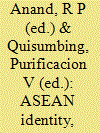

|
|
|
|
|
| Publication |
Quezon city (Phillpines)University of the Philippines Law center, UP Law Center and East-West Center Culture Learning Institute, 1981.
|
| Description |
xxx, 411p.hbk
|
|
|
|
|
|
|
|
|
|
|
|
Copies: C:1/I:0,R:0,Q:0
Circulation
| Accession# | Call# | Current Location | Status | Policy | Location |
| 022222 | 959/ANA 022222 | Main | On Shelf | General | |
|
|
|
|
| 2 |
ID:
120540
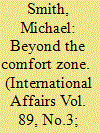

|
|
|
|
|
| Publication |
2013.
|
| Summary/Abstract |
This article explores the extent to which the European Union (EU) has responded effectively to the rising powers of Asia, Latin America and Africa, and whether the Union has been able to construct an effective diplomacy for dealing with them.
It starts from the observation that the EU has significantly developed its diplomatic apparatus since the Lisbon Treaty, and that this apparatus is largely directed towards the establishment of negotiated order at the regional and global levels. The article identifies a number of tensions and contradictions that arise from the EU's status and role in the global arena and that feed into its quest for negotiated order.
It goes on to assess the challenges to EU positions and strategies that arise not only from the emergence of new powers in the world arena, but also from the changes in global structures and processes that accompany this development.
The article then investigates how these challenges have interacted with the search for negotiated order in a series of issue areas: security, commercial policy, development, environment and energy. It argues that in recent years the EU has, in a variety of ways, been taken outside its comfort zone and that while the European Union can and must seek to re-establish negotiated order in its external relations, the challenge of doing so is severe.
|
|
|
|
|
|
|
|
|
|
|
|
|
|
|
|
| 3 |
ID:
126701
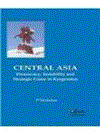

|
|
|
|
|
| Publication |
New Delhi, Pentagon Press, 2014.
|
| Description |
xx, 276p.Hbk
|
| Standard Number |
9788182747524
|
|
|
|
|
|
|
|
|
|
|
|
Copies: C:2/I:0,R:0,Q:0
Circulation
| Accession# | Call# | Current Location | Status | Policy | Location |
| 057546 | 958/STO 057546 | Main | On Shelf | General | |
| 057547 | 958/STO 057547 | Main | On Shelf | General | |
|
|
|
|
| 4 |
ID:
048035
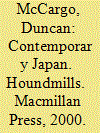

|
|
|
|
|
| Publication |
Houndmills, macmillan Press, 2000.
|
| Description |
xii, 223p.hbk
|
| Series |
Contemporary States and Societies
|
| Standard Number |
0333710022
|
|
|
|
|
|
|
|
|
|
|
|
Copies: C:1/I:0,R:0,Q:0
Circulation
| Accession# | Call# | Current Location | Status | Policy | Location |
| 042337 | 952/MCC 042337 | Main | On Shelf | General | |
|
|
|
|
| 5 |
ID:
159777
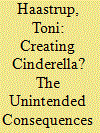

|
|
|
|
|
| Summary/Abstract |
In 2000, the United Nations (UN) launched the Women, Peace and Security (WPS) agenda by adopting Security Council Resolution 1325. The agenda, among other things, called for the greater inclusion of women in peace negotiation practices and structures. While the European Union (EU) has made commitments to implementing the WPS agenda, the literature has not yet captured the institutional dynamics of the EU as it seeks to translate the WPS agenda into reality. This article takes stock of this hitherto excluded area of research. It argues that mediation is the ‘Cinderella’ of the EU’s peace and security institution because it has been ignored as a site for the implementation of the WPS agenda with important implications. Using a feminist institutionalist framework, the article shows the ways in which institutional practices of change aimed at including the new perspectives prompted by the WPS agenda lead to unintended gendered consequences.
|
|
|
|
|
|
|
|
|
|
|
|
|
|
|
|
| 6 |
ID:
085477
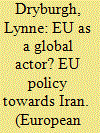

|
|
|
|
|
| Publication |
2008.
|
| Summary/Abstract |
This paper explores EU policy towards Iran to challenge the common implicit or explicit notion that the EU's 'actorness' in the international system rests primarily, or solely, on its Pillar I external relations. Utilising criteria developed to examine the 'actorness' of the EU, the article explores this policy area to demonstrate that the EU's 'actorness' resulted not only from the 'Community' aspects of foreign policy, but also from its Common Foreign and Security Policy (CFSP).
|
|
|
|
|
|
|
|
|
|
|
|
|
|
|
|
| 7 |
ID:
129583


|
|
|
|
|
| Publication |
2014.
|
| Summary/Abstract |
External action has been of growing importance for the Union's Area of Freedom, Security and Justice (AFSJ) and accounted in 2011 already for over 19 per cent of all texts adopted by the Justice and Home Affairs Council. AFSJ related external action has also added a new dimension to previously existing fields of EU external relations. This article first considers the internal and external factors which have influenced the development the external side of the AFSJ and the impact of the post-Lisbon legal and institutional framework, including the special context created by the 'opt-outs' and coherence problems within this framework. It then provides a survey and analysis of the main forms of EU action in this domain (strategy formulation, cooperation with third countries, capacity-building and cooperation with and within international organizations) before assessing-in the conclusions-the implications of this external dimension for both the EU and the Member States and its future developments prospects.
|
|
|
|
|
|
|
|
|
|
|
|
|
|
|
|
| 8 |
ID:
129584
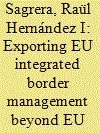

|
|
|
|
|
| Publication |
2014.
|
| Summary/Abstract |
The external dimension of European Union (EU) border management cooperation has recently been developed, in particular through the promotion of integrated border management (IBM). The European Commission has been keen to foster IBM, an attempt to reach EU standards in the absence of an EU common border service. Integrated border management is regulated under the Treaty of Lisbon, and the Stockholm Programme calls for its further development. This article analyses and compares the policy instruments promoting IBM standards beyond EU borders, namely the European Agency for Operational Cooperation at the External Border of the Member States of the EU (FRONTEX) (with the signature of Working Arrangements with the border services of third countries) and the activity of the EU Border Assistance Mission to the Republic of Moldova and to Ukraine (EUBAM) at the Ukrainian-Moldovan border. Moreover, it provides an empirical account of IBM activity carried out in the Eastern Partnership and Russia, and explains the reasons underlying the lack of IBM promotion in the southern Mediterranean countries.
|
|
|
|
|
|
|
|
|
|
|
|
|
|
|
|
| 9 |
ID:
115979
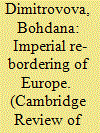

|
|
|
|
|
| Publication |
2012.
|
| Summary/Abstract |
Debates on the European Neighbourhood Policy (ENP) pivot on questions about what kind of political community the EU is becoming and what are the limits of its power projections in the EU's Neighbourhood. Indeed, with this new ambitious and ambiguous policy the EU's external relations are expanding from purely economic to cultural, political and security functions. The EU's desire and need to export its values and norms beyond its borders raises a set of ontological questions about the nature of the EU.
|
|
|
|
|
|
|
|
|
|
|
|
|
|
|
|
| 10 |
ID:
127454


|
|
|
|
|
| Publication |
2014.
|
| Summary/Abstract |
IN HIS BOOK Diplomacy, Henry Kissinger concludes that the United States "faces the challenge of reaching its goals in stages, each of which is an amalgam of American values and geopolitical necessities."1 The recent debates about U.S. military options in Libya and Syria reflect the enduring tension between these intertwined, at times competing components of our external relations. No U.S. statesman can ignore this dilemma, and none will find it easy to strike exactly the right balance between the two, especially in times of crisis.
|
|
|
|
|
|
|
|
|
|
|
|
|
|
|
|
| 11 |
ID:
149822
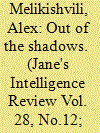

|
|
|
|
|
| Summary/Abstract |
Uzbekistan is showing signs of easing the repression exercised by late president Islam Karimov. Alex Melikishvili analyses the extent to which the country will move away from its post-Soviet isolation and embrace reform, as well as improve external relations.
|
|
|
|
|
|
|
|
|
|
|
|
|
|
|
|
| 12 |
ID:
140174
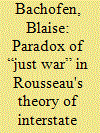

|
|
|
|
|
| Summary/Abstract |
In the Social Contract, Rousseau declares that he has given up the idea of discussing the “external relations” of states. Yet numerous texts—including a recently reconstituted work about the law of war—show that he thought very seriously about the question of the nature and origin of war and of the possibility of making war subject to the rule of law. Rousseau, in contrast to Hobbes, links war's appearance to that of the sovereign states; the state of war is therefore the necessary result of international relations. Moreover, he considers the international law as chimerical. How can he then conceive a non-utopian theory of “just war”? My hypothesis is that his conception of the law of war is deduced from principles of internal political law and arises from pragmatic necessity. The state that discredits itself in its manner of waging war weakens itself while believing that it is reinforcing itself.
|
|
|
|
|
|
|
|
|
|
|
|
|
|
|
|
| 13 |
ID:
180237
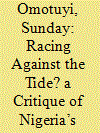

|
|
|
|
|
| Summary/Abstract |
The recent vigorous campaign by Nigerian government for a permanent membership of the United Nations Security Council is, like previous attempts, hinged on the country’s ‘track record’ in peacekeeping operations. However, in recent years, particularly since the uprising of the Boko Haram terrorist group, it appears that Nigeria’s commitment to this role has diminished considerably in its foreign policy priorities. This article, against this background, makes three arguments: First, it argues that Nigeria’s reluctance to keep faith with its peacekeeping mission is undermining the critical platform under which the quest for the seat is based. Second, notwithstanding the possession of the realist’s attributes of a regional leader, Nigeria’s poor image and dearth of soft power has created legitimacy crisis for it among regional states and beyond as none of its traditional allies in the Security Council has thrown its weight behind its bid. Finally, the study shows that the preponderance number of Nigerians does not subscribe to Nigeria’s bid in view of the security and socio-economic crises battling the country. Rather than dissipating energy on the quest, such effort should be channelled towards addressing the myriad domestic challenges threatening human security in the country.
|
|
|
|
|
|
|
|
|
|
|
|
|
|
|
|
| 14 |
ID:
040101


|
|
|
|
|
| Publication |
London, C Hurst & Company, 1987.
|
| Description |
xvi, 395p.hbk
|
| Standard Number |
1850650284
|
|
|
|
|
|
|
|
|
|
|
|
Copies: C:1/I:0,R:0,Q:0
Circulation
| Accession# | Call# | Current Location | Status | Policy | Location |
| 029679 | 959.104/TAY 029679 | Main | On Shelf | General | |
|
|
|
|
| 15 |
ID:
076802


|
|
|
|
|
| Publication |
2007.
|
| Summary/Abstract |
Several new ways of security-speak are about to enter the European scene. The article seeks to identity these by investigating the use and unfolding of the security argument in the context of the European Union's (EU) new security doctrine and the devising of an explicit neighbourhood policy. In addition to tracing the way the plot structure underpinning the EU is changing, alternative options are sought by tapping into the potential offered by the way security works in the case of the Nordic constellation. Juxtaposing of the EU and the Nordic entity is also there in order to challenge the increasingly closed and non-negotiable European configuration and to open it up for critical scrutiny.
|
|
|
|
|
|
|
|
|
|
|
|
|
|
|
|
| 16 |
ID:
176929
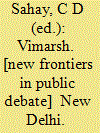

|
|
|
|
|
| Publication |
New Delhi, Pentagon Press, 2020.
|
| Description |
xvi, 230p.hbk
|
| Standard Number |
9788194465973
|
|
|
|
|
|
|
|
|
|
|
|
Copies: C:1/I:0,R:0,Q:0
Circulation
| Accession# | Call# | Current Location | Status | Policy | Location |
| 059981 | 954/SAH 059981 | Main | On Shelf | General | |
|
|
|
|
|
|
|
|
|